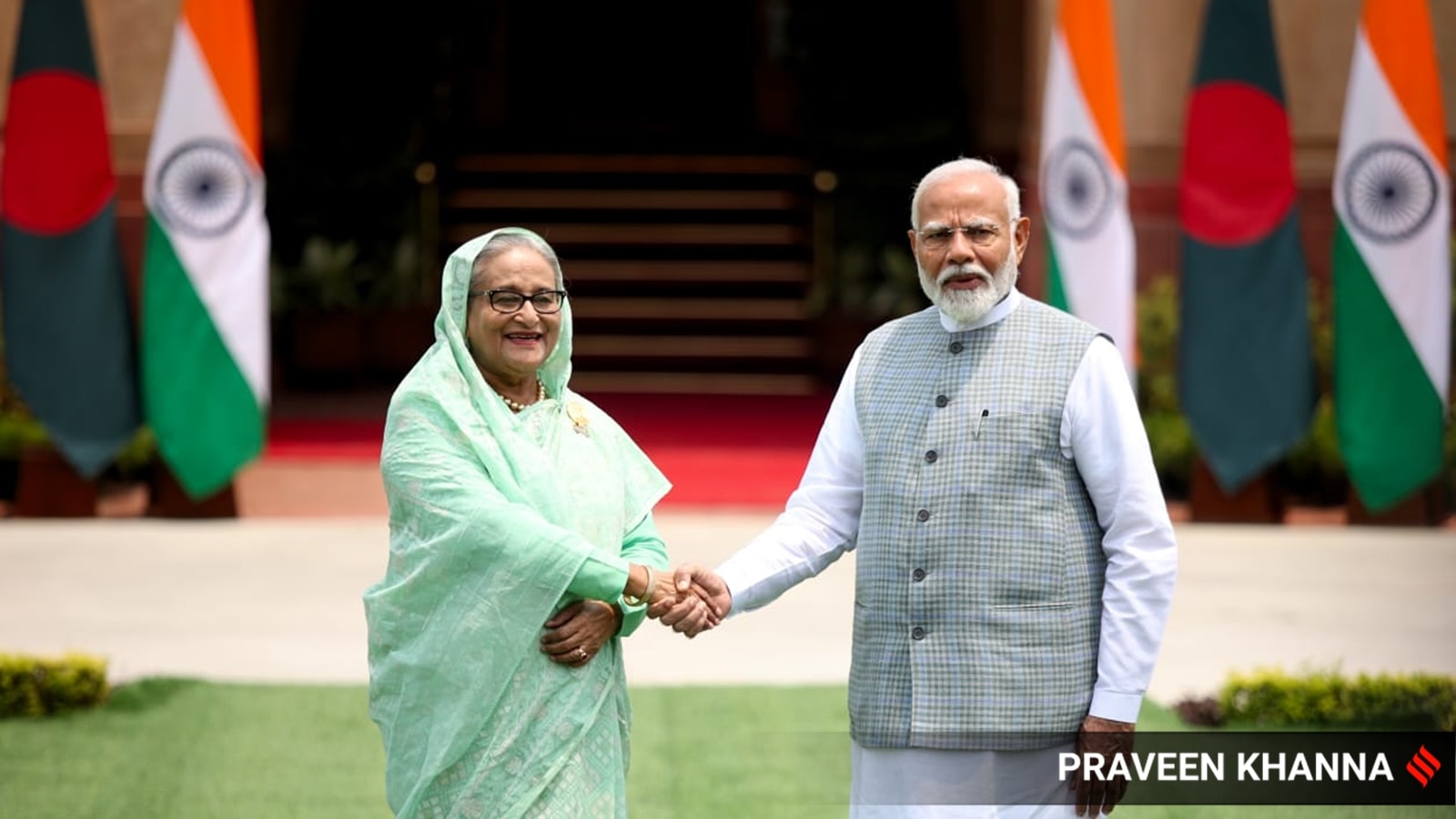The third consecutive innings of the partnership between Indian Prime Minister Modi and Bangladesh Prime Minister Sheikh Hasina marks a pivotal moment in relations between the two South Asian neighbours. With PM Hasina being the first state guest hosted by India on June 21 and 22, the significance of the bilateral ties comes into sharp focus, underscored by the signing of 10 MoUs, including seven new and three renewals. The Modi-Hasina partnership should score more where desired and bowl less in situations that can lead to losses for both.
Economic ties: The economic relationship between the two countries has grown with bilateral trade reaching $15.9 billion in 2023 spanning across various sectors, including textiles, pharmaceuticals, agriculture and more. Bangladesh’s ability to conduct rupee transactions up to $2 billion with India, eases pressure on her foreign currency reserves, facilitating smoother trade. The new MoUs further enhance cooperation; the Shared Vision for India-Bangladesh Digital Partnership, in particular, is expected to boost collaboration in emerging technologies and digital economies.
Energy, infrastructure and connectivity: Infrastructure projects are enhancing Indo-Bangla connectivity and trade facilitation. The Akhaura-Agartala cross-border rail link, connecting India’s northeast to Bangladesh, and the Khulna-Mongla port rail line are landmark initiatives improving regional transport networks. The newly signed MoU on rail connectivity will further improve regional transport networks. India has been supplying power to Bangladesh, with exports reaching 1,160 MW in 2023. The Maitree super thermal power plant, a JV with its recently added Unit II, showcases collaboration in critical infrastructure. Cooperation is also being explored in renewable energy, particularly solar and wind power. Commencement of hydroelectric 40 MW power export from Nepal to Bangladesh through the Indian grid, marks a significant step in regional energy cooperation. The Shared Vision of India-Bangladesh Green Partnership for a sustainable future will strengthen existing cooperation in renewable energy and environmental sustainability. The MoU on Blue Economy and Maritime Cooperation in the Bay of Bengal and Indian Ocean Region will catalyse collaboration in maritime resources and ocean-based industries.
Security: Both countries manage their 4,096.70 km long international border through various bilateral mechanisms, including regular talks between border guarding forces and nodal drugs control agencies to address common challenges like terrorism, extremism, and transnational crimes. The newly signed MoU between the Defence Services Staff College (DSSC), India and Defence Services Command and Staff College (DSCSC), Bangladesh for cooperation in military education will further strengthen the security relationship.

The ongoing collaboration in intelligence sharing and joint counterterrorism is critical for maintaining regional stability and security. Earlier, a $500 million line of credit was extended by India for defence purchases which can not only enhance Bangladesh’s defence capabilities, but also strengthens strategic partnership between the two.
When not to bowl
Teesta water sharing: This remains a bone of contention with India currently controlling 55 per cent and Bangladesh claiming 50 per cent during the dry season from December-May. Both countries have constructed diversion dams on the river, providing irrigation to approximately 9,20,000 hectares in West Bengal, India, and 7,50,000 hectares in Bangladesh. The resolution of this dispute is critical for agriculture, livelihoods, and environmental sustainability for both. The complexity of the issue is compounded by India’s domestic politics. West Bengal Chief Minister Mamata Banerjee has been opposing the water-sharing agreement, arguing that it would adversely affect the northern parts of her state during the dry seasons.
The challenge lies in balancing the needs of West Bengal’s agriculture with Bangladesh’s water requirements, while addressing environmental concerns and setting a good precedent for managing shared water resources in South Asia. After her recent electoral success, Mamata Banerjee should not keep on bowling against the will of Delhi, resulting in frustration in Dhaka whose Prime Minister’s credibility at home is being hurt by this deadlock. China has already submitted a $1 billion proposal for the Teesta River Comprehensive Management and Restoration Project and India is now playing catch up by offering to fund it. This puts PM Hasina in a bind, as rejecting China could strain ties with one of Bangladesh’s top trade and defence partners. The project is vital for people in Bangladesh’s northwest and Dhaka will have to deftly navigate the challenge by balancing its interests amid the Sino-Indian tensions.
Border issues: Border killings remain a sensitive matter, straining bilateral relations. Despite joint patrols, increased communication between border forces, and use of non-lethal weapons, managing illegal cross-border activities while ensuring civilian safety remains a challenge. Ongoing discussions on border demarcation, enclave exchanges, and coordinated management reflect both countries’ commitment to balancing security concerns with positive relations. Recurring border fatalities go against the spirit of bilateral trust, cooperation, and regional stability.
The South Asian trajectory
The Indo-Bangla relationship is entering a new phase with the 10 MoUs reflecting growth and collaboration, covering areas from digital partnership and green initiatives to space technology and maritime cooperation. Regional connectivity initiatives are expected to enhance trade and transform the South Asian economic landscape.
The ties will not only shape the Indo-Bangla bilateral relations but also have the potential to positively impact the broader South Asian region by setting new standards for regional cooperation and collaboration. Initiatives like the BBIN motor vehicles agreement, and the BIMSTEC free trade agreement could further strengthen economic cooperation, regional integration, and stability across the subcontinent. These initiatives are good examples for boosting mutually rewarding neighbourly relationships, paving the way for a more interconnected and prosperous South Asia.
The writer is chairman of the international think tank The Institute for Policy, Advocacy, and Governance (IPAG), India with presence in Delhi, Dhaka, Melbourne, Dubai, and Vienna


